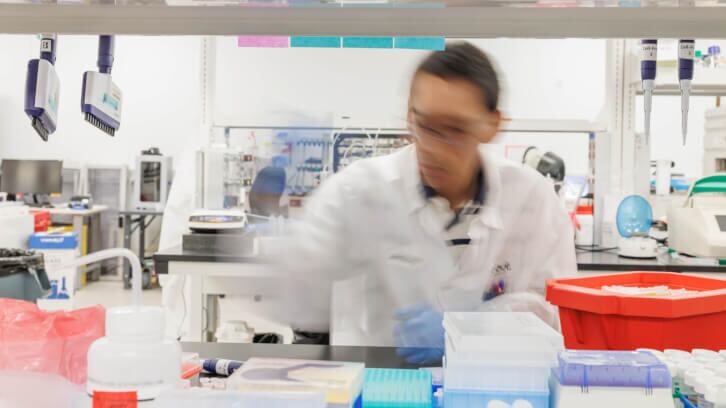Earlier this year, Virginia-based biotechnology start-up Capra Biosciences secured project funding through BioMADE, “a public-private partnership that is securing America’s future though bioindustrial manufacturing innovation, education, and collaboration supported by Schmidt Futures, a philanthropic initiative of Eric and Wendy Schmidt” to expand its novel bioreactor technology and begin construction on a green biochemical production facility.
The company, which “uses a biofilm-forming microbe and its proprietary bioreactors to transform low-cost feedstocks like agricultural byproducts or food waste into a variety of chemicals, including their first product, retinol” according to a company press release detailing the announcement, “is partnering with researchers at Boston University (BU) and Next Rung Technology to further refine its processes and fine tune the waste-based feedstock for biochemical production” as part of its expansion plans.
To learn more about Capra Biosciences, the company’s use of investment funds for expansion plans for plant production, which is expected to open in mid-2025, the challenges the company needed to overcome to launch its innovative technology, and the significance of Capra Biosciences’ innovations in the ingredient production space, CosmeticsDesign spoke to Andrew Magyar, Co-founder and CTO of Capra Biosciences for his insights.
About Capra Biosciences
The company, which “began in a science lab,” said Magyar, honed its focus developing “bioreactors that were capable of turning feedstocks into useful chemicals in a simple, efficient, and more environmentally friendly way,” he explained.
For manufacturers and suppliers to the cosmetics and personal care product industries, Capra Biosciences’ work is particularly significant as “retinol, which is a common component in skin care cosmetics, was among the first chemicals to be produced and fine-tuned” in the company’s proprietary bioreactor processes.
“What that means is,” he added, that “because of how we extract and process our retinol through our bioreactor, we're able to offer it in different blends to meet customer requirements, including allowing it to be a potential drop-in replacement for current retinol products on the market.”
The company’s evolution in the ingredient manufacturing and processing space has not been without its challenges.
“We started Capra during the pandemic, and getting the company off the ground was a big challenge, including figuring out how to engage with potential investors without meeting in person, selecting and building our lab, and navigating supply chain challenges,” said Magyar.
Application of IndieBio and BioMADE investment funds
Therefore, securing the BioMADE funding for production facility expansion is particularly significant to ensuring success for the company’s mission to provide manufacturers and formulators with the clean ingredients they need for product formulation.
“Thanks to the IndieBio program [a venture capital program specifically focused on providing funding to biotech startup companies] we were able to jumpstart the company, learn how to build a business, and get face time with investors,” he explained.
The addition of the BioMADE funding supplements the initial IndieBio investment and will further strengthen Capra Biosciences in tackling “supply chain challenges, [which] are something that have really validated our vision for Capra - using distributed manufacturing from local feedstocks to make products that are more reliably available and sustainable.”
In the coming months, he elaborated, “the BioMADE funding really enables us to focus on scaling and optimizing our bioreactor technology, which will allow us to more rapidly scale new products we are developing.”
Next steps for Capra Biosciences
Moving forward, Capra’s mission to “to make sustainable versions of the ingredients that manufacturers and suppliers use in cosmetic and personal care products” remains in full force, said Magyar.
Currently, the company’s “bio-processors offer a scalable solution for creating cosmetic ingredients without using petroleum-based ingredients and relies on locally sourced feedstocks and distributed manufacturing to reduce supply chain issues and costs,” he added, but the increased funding will be used to expand and improve on these processes.
While this investment “starts with our first product, retinol, we’re working to expand our product portfolio to additional items such as emollients and other ingredients that today only come from petroleum,” he shared further. “Beyond retinol,” he explained, “Capra is working on a product in the emollient space and welcomes partnerships to co-develop additional sustainable ingredients.”
There is significant industry need for innovation in this space, he said, as “today, many sustainable cosmetics ingredients have a significant price premium, which leaves manufacturers and consumers in a dilemma between choosing the cost saving option or the sustainable one.” The investment will therefore fund “new bioreactor technology,” which Capra can utilize to “alter those economics so sustainable ingredients are at price parity or better,” he stated.
“At the same time,” he added, “our distributed manufacturing system eliminates supply chain disruptions and reduces transportation costs, along with their associated environmental impact, which gives cosmetics companies another angle to tout in their sustainability efforts.”
“Looking toward the future,” Magyar concluded, “Capra is focused on classes of ingredients that create a silky feeling that consumers demand but are hard to produce via traditional biological means,” and the company looks forward to mid-2025 when its mission will be further realized through its expanded production facility opening.




